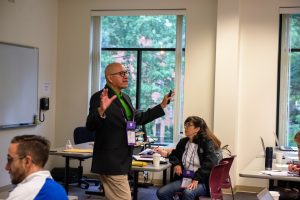 CORNERSTONE 5: PROFESSIONALISM OFF THE PODIUM
CORNERSTONE 5: PROFESSIONALISM OFF THE PODIUM
So, up to this point, I’ve the following four cornerstones for successful teaching: planning and preparation for effective teaching, strategies for creating a positive learning environment, how to engage in effective instruction, and how to develop assessment strategies.
The final cornerstone focuses on professionalism off the podium.
First, start by maintaining accurate records and documentation. Grade and document assignments in a timely manner and respond to correspondence, such as emails and phone calls within a 24-hour work day. Students, parents, and administrators value educators who respond quickly because, frankly, we live in a day and age where everyone expects immediate gratification. More importantly, a teacher’s feedback impacts our students’ progress in learning, either in a positive or in a negative manner, depending on the timing of our response.
My practicum professor, Dr. Barrie Wells, was an exceptional role model and inspiration. He would push the limits of his students’ and it seemed like we were given a never-ending pile of homework assignments. Although, what I admired so much was that, with rare exception, he always graded and returned our assignments by the very next class AND he would provide a recorded commentary to provide further guidance for his students. I quickly accepted the fact that he was going to expect much from me but also demand even more from himself. With that in mind, I decided to go out of my way to turn in my assignments on time and give Dr. Wells my best effort. So, the point is that prompt responses to correspondence is an important skill to develop.
The second strategy involves how we communicate with the school community. It’s important to share the value of our program with the community. Consider using social media platforms, newsletters, daily announcements, information inserts included in the concert programs, meetings, or any other form of communication that effectively creates awareness and support for our music program within the school and community.
The next strategy is to participate in the professional community. I can’t emphasize enough how important it is to build and maintain relationships with other colleagues. That mutual support and sharing of ideas is invaluable, especially if we are in a situation where we teach alone for most of the day. Also, be actively involved in the state music educators’ association, as well as other professional entities, and develop a better understanding of the profession from as many perspectives as possible. On campus, step out of the music classroom and get involved in other ways to better appreciate the bigger educational picture.
The third strategy related to professionalism is our commitment to being life-long learners. When I first started teaching I thought I had a good grasp of all the things I needed to know to get started. Have you ever heard of the phrase, “You don’t know what you don’t know?” Fast forward thirty-plus years to today and I can assure you that I’ve never had more questions about: instrument pedagogy, score study, knowledge of repertoire, all things related to technology, classroom management, financing, and the list goes on. The point is that there’s always room for more knowledge and growth.
Think about taking on two major projects per year that advance our teaching skills. Focus on two projects that will push the envelope and be of special interest to us. Each year, choose two different projects and continue to be amazed at how our bank of knowledge grows.
The last strategy but certainly not least is to strive to maintain a balanced approach to life. For those who are passionate about becoming the best music educators possible, please remember how important it is to seek out balance that also includes other aspects of life besides our profession. I’ll be the first to admit, this can be quite a challenge for some, myself included. However, step back and take time to understand and appreciate the bigger picture. Consider our: personal life, family obligations, social life, health and wellness, spiritual well-being, and financial stability. These important aspects of our life deserve careful consideration, especially if we aspire to live a fulfilling career in this profession for the long haul.
So, I’ve shared the five cornerstones related to planning and preparation, creating a positive environment, engaging in effective instruction, assessment, and professionalism. Our students are good reminders of a very simple, but powerful, concept. The more they practice, the better they perform. Likewise, the more that we as teachers engage in the cornerstones of successful teaching, the more likely we will positively impact the lives of our students in music and beyond.
With that in mind, thanks for watching this video series and here’s to your success!
